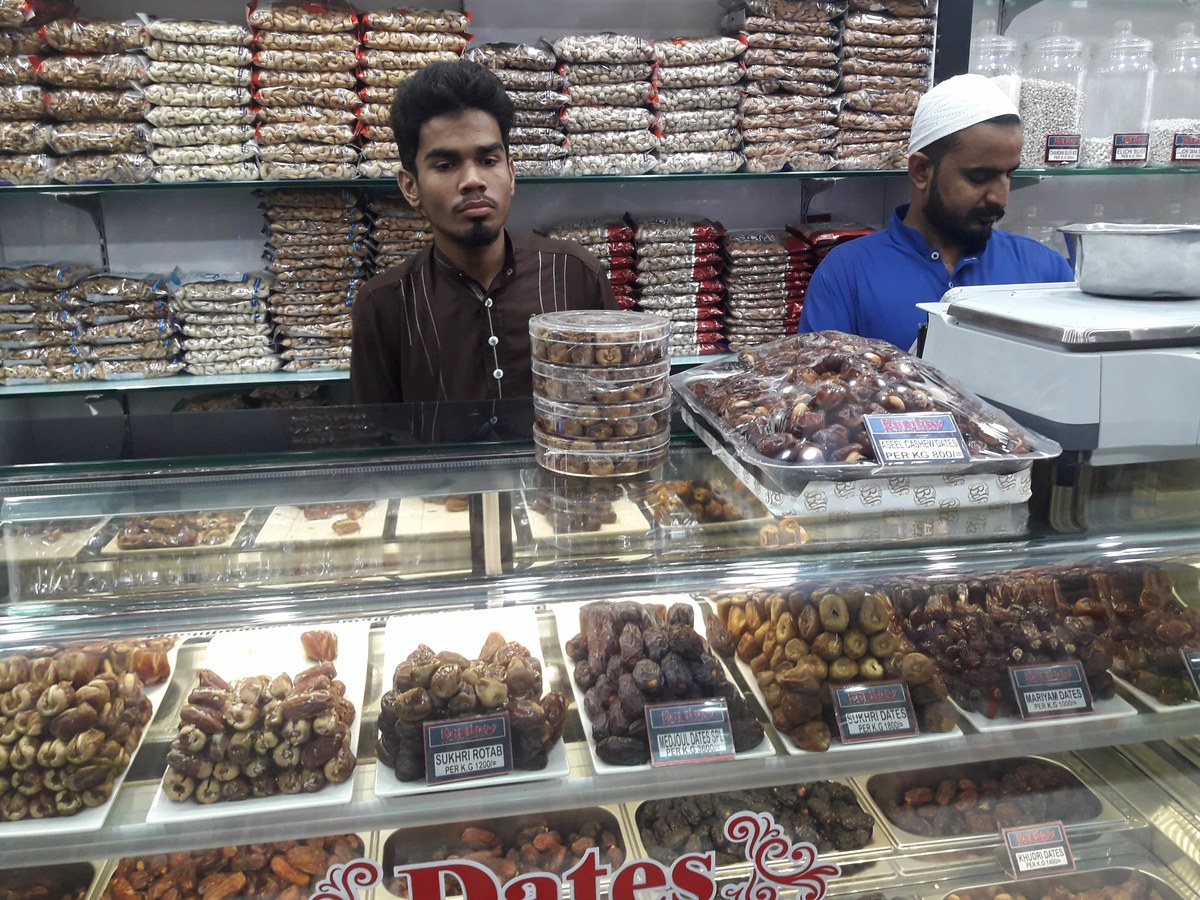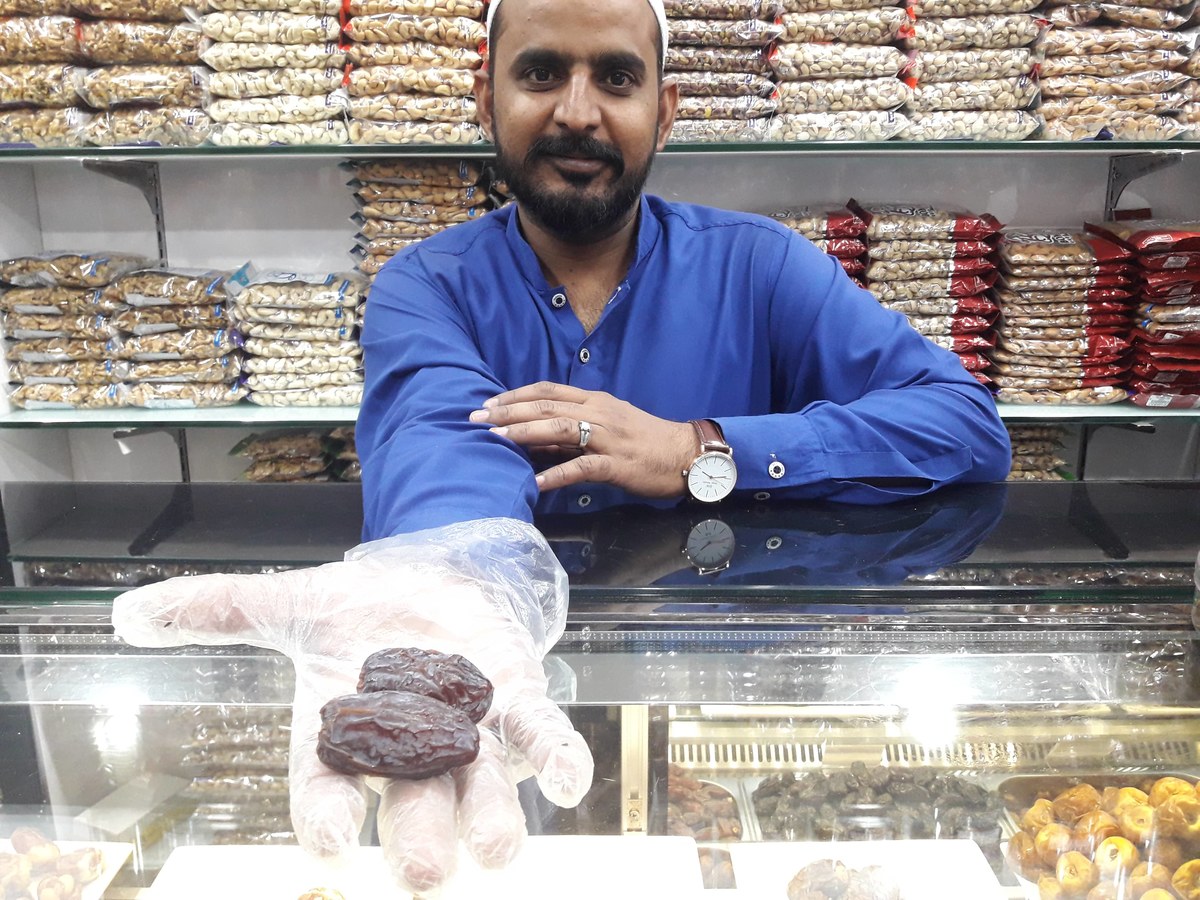KARACHI: Every year, Hajji Abubaker personally travels to Saudi Arabia to pick the best Arabian dates available at farms in the Kingdom, which he then brings back to Pakistan, adds honey, pistachios and almonds to many of the varieties and sells as “super luxury” products to rich, high-maintenance clients.
Saudi Arabia, the world’s top oil exporter, is also a leading producer of dates. Pakistan too is among the world’s top 10 producers of dates but meets half of its demand through imports.
The demand for dates skyrockets in the Muslim fasting month of Ramadan, when it is customary to break one’s fast with dates at the sunset Iftari meal.

The prices of Saudi dates, pictured on May 8, 2019, are much higher than Pakistani dates. (Photo Khurshid Ahmed)Caption
“I have direct links with date farm owners in Saudi Arabia,” Abubaker told Arab News at his Bombay Dry Fruits store on Karachi’s famous food street, Burns Road. “I go every year to collect the best quality dates produced in the Kingdom and directly buy A category dates from the farms,” he added, showing the many varieties of Saudi dates he had on display: Ajwa, Anbara Safwai, Sukkari, Barhi, Saghai , Kalmi, Khudri, Kholas and Majdool.
The date variety most in demand, Abubaker said, was Ajwa, and demand for it continued through the year “due to its healing properties.” “Demand for other varieties peaks with the start of [the month of] Shahban and ebbs after Ramadan,” Abubaker said.
Compared to locally produced dates, the prices of Saudi dates are very high: Rs1,400-3,000 per kilogram compared to Rs200-400 for Pakistani dates. Due to the huge price differential and in the absence of organized imports from the Kingdom, only a few shopkeepers in the city’s largest dates bazaar, Khajjoor Market, sell Saudi varieties.

Saudi dates being packed for sale at a Karachi market in Pakistan on May 8, 2019. (Photo Khurshid Ahmed)Caption
“We have different varieties of Saudi dates but mostly their demand is low due to high prices as people look for cheaper options,” shopkeeper Razi Khan told Arab News.
But Abubaker, though he is also feeling the burn of rising prices at a time when inflation is at a five-year high in Pakistan, said he would much rather sell quality dates than be bogged down with quantity.
“Earlier I was doing business as a wholesaler but now I have decided to just confine myself to the retail business. This year I have imported only one container because it is not viable,” Abubaker said.
Pre- and post-harvest care of dates in Saudi Arabia coupled with a suitable atmosphere are the reason the quality of the Kingdom’s dates is so high.

A salesman in Karachi city in Pakistan shows an expensive variety of Jordanian dates on May 8, 2019. (Photo Khurshid Ahmed)Caption
“The date fruit in Saudi Arabia ripens on the tree due to low humidity level,” said Professor Ghulam Sarwar Markhand, a former director at the Date Palm Research Institute. “The produce is directly packed in cartons from the farms as compared to other countries including Pakistan where high humidity level prevails.”
The utilization of modern technology by the Kingdom’s date farmers also enhances the shelf life of dates: “Due to a super cooling system adopted in Saudi Arabia, we can store their dates for more than a year,” Abubaker said.
Now, Saudi varieties of dates are also being planted in Pakistan, said Markhand: “Around 7 varieties of Saudi dates have been planted in Pakistan through plant tissue culture. The famous varieties are now crossing the borders.”












